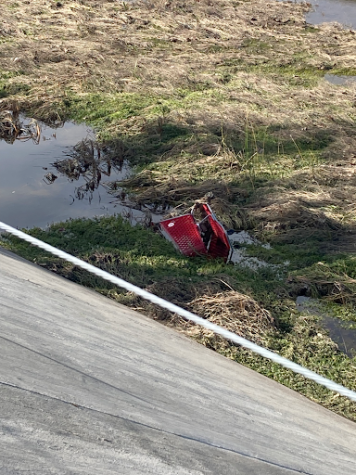Cart Horrors: How shopping carts contribute to ocean pollution

Creative Commons: Flickr by Leonard J Matthews
CARTS CONTAMINATING COASTLINES: Shopping cart ocean pollution seemingly becomes a greater problem than we think
February 21, 2023
Ocean pollution has been a big topic of controversy recently. Plastic straws, bags, cups, toys and more float around in garbage patches in different parts of the ocean. However, many individuals may overlook obscure items that fall into the water. One item in particular stands out: shopping carts.
In the United States alone, there are an average of 200 to 250 shopping carts in each grocery store, and with there being over 164,000 retail and grocery stores in the nation, the amount of carts adds up.
According to an article by a Croatian News outlet, 73 shopping carts were found within the water of a shipping dock in Dubrovnik, a coastal city in Croatia. Divers pulled the carts from the bottom of the lake, which belonged to a nearby store. Whilst the stainless steel can weigh up to 70 pounds, shopping carts that linger at the bottom of reserves and oceanic regions can trap wildlife and put a strain on the ecological habitat.
Shopping carts were also seen by students along the coasts of California, with half-submerged carts found along the San Diego Creek.
“I was biking early January at noon along the Peters Canyon Channel when something red caught my eye, and I was surprised to see that it was a partially submerged Target shopping cart,” Northwood alumnus Akira Ono said. “The nearest Target from there would’ve been a 20 minute walk, and made me think of the other times I’d seen shopping carts littered around parts of the city.”

Not only have shopping carts added to pollution across the world, but they have also contributed to greater contamination of wildlife across various reserves and oceans. An article published by National Geographic reveals that ocean pollution and its production has increased exponentially, with its expected rate of 448 million tons to double by the year 2050. Larger items like shopping carts can cause even more damage ultimately showing the true harm of pollution throughout the world.
Whilst solutions for students may seem limited, there are actions that grocery stores can implement to prevent shopping carts from leaving their marked premises. Particularly, theft protection of shopping carts can be prevented through the use of coin transactions embedded within the shopping carts. Asian countries such as China and Korea use this method as the coin insertion allows for the carts to be easily returned, and if a coin is not inserted, the wheels will lock in the position that it is left in, preventing them from being used outside store hours.
As Northwood students, we can take philanthropic approaches in an attempt to end pollution through participating in beach clean-ups, attending city council meetings to propose laws for environmental efforts and more. Students can partake in change through volunteering in beach clean-ups and other programs. Northwood’s key club provides monthly beach clean ups, along with the state of California providing clean up programs for various reservoirs, such as the Natural Resource Volunteer program, which monitors state lands and raises awareness towards habitat pollution.
Even acts as simple as putting shopping carts away can help to create a big difference. Whilst this may seem like a miniscule problem at hand, it ultimately can become a greater problem in the future, and we must take preventative measures as a generation in order to stop pollution from growing bigger than us.
























































